Table of Contents Show
There may be products. Products are independently selected by our editors. We may earn an affiliate commission from the links with no charge to you, example: as Amazon Affiliate.
Disclaimer: We may earn an affiliate commission from the links with no charge to you.
We’ve identified January 2025’s top six legal books based on expert recommendations and sales data. Leading the pack is Quicken Willmaker & Trust 2025, followed by the essential Foundational American Documents collection. The Law Firm Growth Accelerator and Successful Trial Skills Guide remain popular among practitioners, while Crazy Lawsuit Stories offers an entertaining legal perspective. The all-encompassing Master Legal Vocabulary rounds out our selection. Let’s explore what makes each of these resources uniquely valuable.
Key Takeaways
- Quicken Willmaker & Trust 2025 leads sales with its comprehensive DIY estate planning software and physical book combination.
- Legal experts value updated jurisdictional content and practical applications over theoretical discussions in best-selling law books.
- Digital-physical hybrid formats dominate the market, offering flexibility and regular updates for changing legal landscapes.
- Author credentials and real-world experience significantly influence purchasing decisions among legal professionals.
- Current best-sellers focus on practical applications like trial skills, estate planning, and law firm growth strategies.
Quicken Willmaker & Trust 2025: Book & Online Software Kit
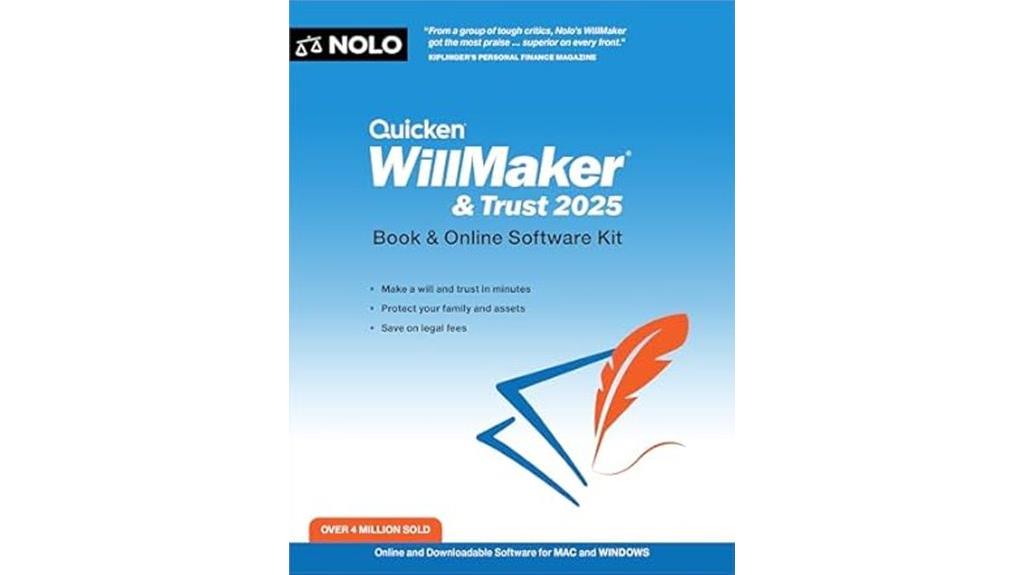
For individuals seeking a cost-effective alternative to attorney fees, Quicken Willmaker & Trust 2025 delivers an all-inclusive DIY estate planning solution. We’ve found this software kit’s intuitive interface mirrors TurboTax’s simplicity, guiding users through personalized wills, medical directives, and trusts.
While the included book offers basic guidance, the software’s extensive questionnaire system helps craft detailed estate documents. We should note some limitations: you can’t name more than two successor trustees or adjust certain distribution methods. Despite occasional access issues, customer support typically resolves problems via email. For those with straightforward estate needs, this kit offers significant savings over traditional legal services.
Best For: Individuals with straightforward estate planning needs who want a cost-effective alternative to attorney services and are comfortable with a DIY approach.
Pros:
- User-friendly interface similar to TurboTax with comprehensive questionnaires
- Significant cost savings compared to traditional attorney fees
- Includes both physical book and software for creating multiple document types (wills, trusts, medical directives)
Cons:
- Limited flexibility for complex estates (only two successor trustees allowed)
- Restricted distribution method options for beneficiaries
- Customer support can be slow to respond and software access issues occasionally occur
The Constitution, Declaration of Independence & Bill of Rights
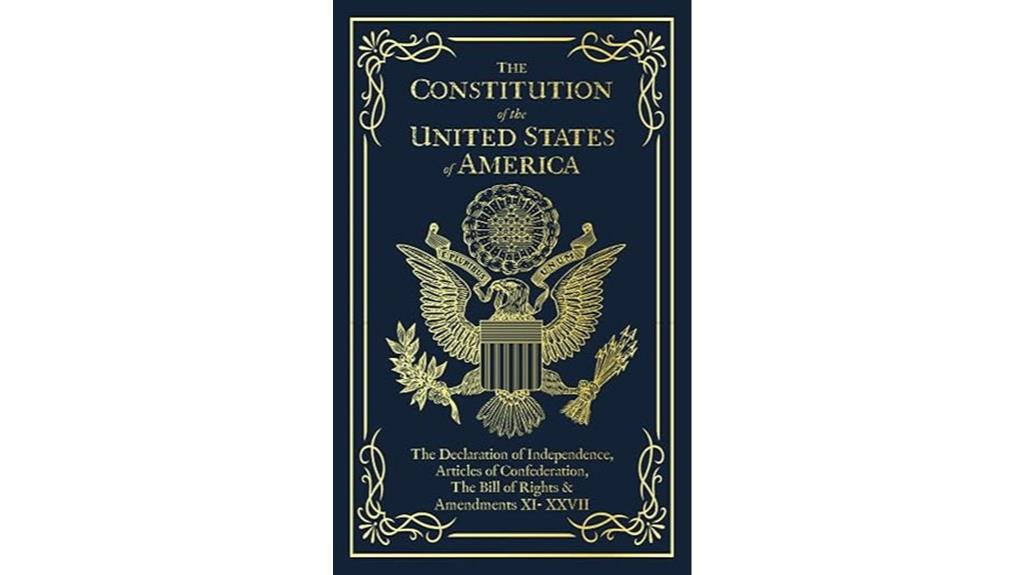
Civic-minded individuals seeking a thorough understanding of American democracy will find immense value in studying the Constitution, Declaration of Independence, and Bill of Rights.
We can’t overstate the significance of these foundational documents. They establish our government’s framework, protect essential freedoms like speech and religion, and guarantee accountability through checks and balances. The Constitution serves as our supreme law, while the Bill of Rights safeguards individual liberties from government overreach.
Understanding these documents helps us recognize and defend our rights, making them vital tools for preserving democracy. They’re living documents that require our active engagement to remain effective guardians of liberty.
Best For: Educators, students, civic leaders, and engaged citizens seeking comprehensive knowledge of America’s founding principles and governmental framework.
Pros:
- Provides clear understanding of fundamental rights and governmental structure through original source documents
- Equips readers with knowledge to recognize and defend against constitutional violations
- Creates foundation for informed civic participation and advocacy
Cons:
- Complex legal language can be challenging for some readers to understand
- Requires significant time investment to study and comprehend thoroughly
- Historical context needed to fully grasp the significance of certain provisions
Law Firm Growth Accelerator: Proven Framework for Business Growth
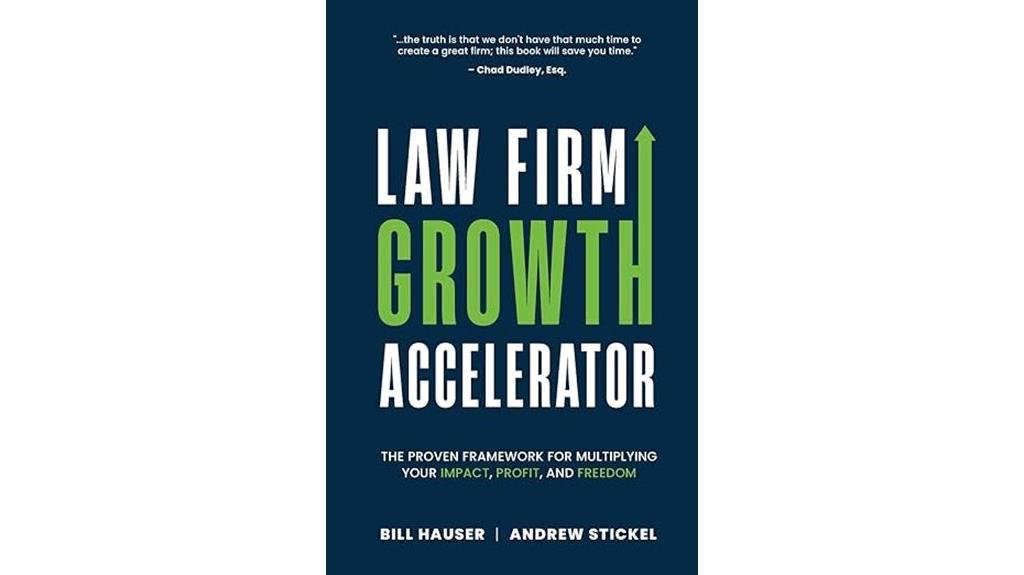
Law firm owners seeking substantial business growth will find invaluable guidance in “Law Firm Growth Accelerator.” While many lawyers excel in their legal practice, they often struggle with the business aspects of running a successful firm.
We’re impressed by authors Andy Stickel and Bill Hauser’s ability to transform complex growth tactics into clear, actionable strategies. Their proven framework addresses everything from client acquisition to operational efficiency, making it especially valuable for solo practitioners. What sets this book apart is its emphasis on mindset transformation and leadership development. Whether you’re an experienced attorney or new to practice management, you’ll discover essential tools to scale your firm effectively.
Best For: Solo practitioners and law firm owners who excel in legal practice but need guidance on business growth, operational efficiency, and practice management.
Pros:
- Transforms complex business growth strategies into clear, actionable steps
- Written by industry experts with extensive coaching experience
- Facilitates essential mindset shifts for lawyers transitioning to business ownership
Cons:
- Length may be intimidating for time-constrained practitioners
- Primary focus on solo and small firms may limit relevance for larger organizations
- May require significant time investment to implement all strategies effectively
Successful Trial Skills Guide for Attorneys (The Mentor Esq. Series)
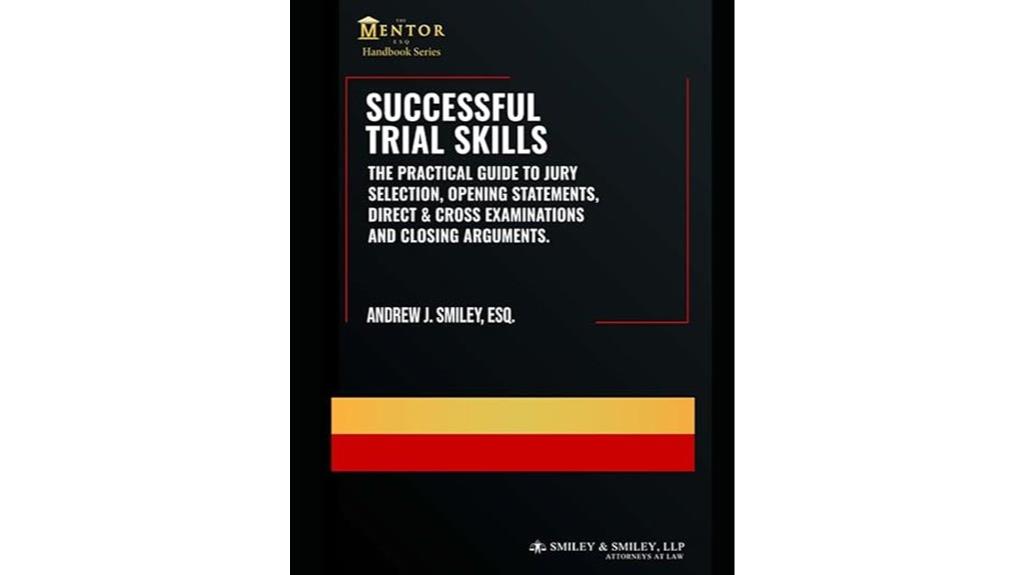
Professionals seeking to sharpen their trial advocacy skills will find invaluable guidance in “Successful Trial Skills Guide for Attorneys.” This thorough resource stands out by providing actual trial notes and step-by-step examples from real cases, making it essential reading for both novice attorneys and seasoned litigators.
We’re particularly impressed by the author Andrew’s detailed coverage of critical trial phases, from jury selection to closing arguments. While some readers note the content skews toward personal injury cases, the strategies and principles apply universally. Despite minor publishing quality concerns, we can’t overlook the book’s remarkable practical value for anyone serious about mastering courtroom advocacy.
Best For: Law students, new attorneys, and experienced litigators seeking to enhance their trial advocacy skills through practical, real-world examples and strategies.
Pros:
- Provides actual trial notes and step-by-step examples from real cases
- Comprehensive coverage of all trial phases from jury selection to closing arguments
- Written by a highly successful trial attorney with proven expertise
Cons:
- Content may be too focused on personal injury cases
- Some issues with publishing quality noted by readers
- May be too general for specialized practice areas
Crazy Lawsuit Stories: 101 Most Bizarre Legal Cases

Students and young readers fascinated by unusual legal cases will find “Crazy Lawsuit Stories: 101 Most Bizarre Legal Cases” a compelling introduction to the world of law. We’ve noticed this book particularly resonates with middle schoolers who dream of becoming lawyers, though it’s not quite detailed enough for serious legal study.
While we appreciate the book’s entertaining approach to bizarre cases, from kidnapper lawsuits to parents demanding grandchildren, it falls short on providing thorough case outcomes. The format’s sparse layout and centered text have drawn criticism for inflating the page count. Still, it’s successful at making legal concepts accessible through humor and quirky true stories.
Best For: Middle school students and young readers interested in law who want an entertaining introduction to unusual legal cases through light, humorous stories.
Pros:
- Makes complex legal concepts accessible through entertaining, quirky true stories
- Engaging format appeals to younger readers interested in law
- Provides humorous real-world examples that stick in readers’ memories
Cons:
- Lacks detailed case outcomes and thorough legal analysis
- Format uses excessive white space and centered text, inflating page count
- Not suitable for serious legal study or professional reference
Master Legal Vocabulary & Terminology Guide (425+ Legal Documents & Templates)
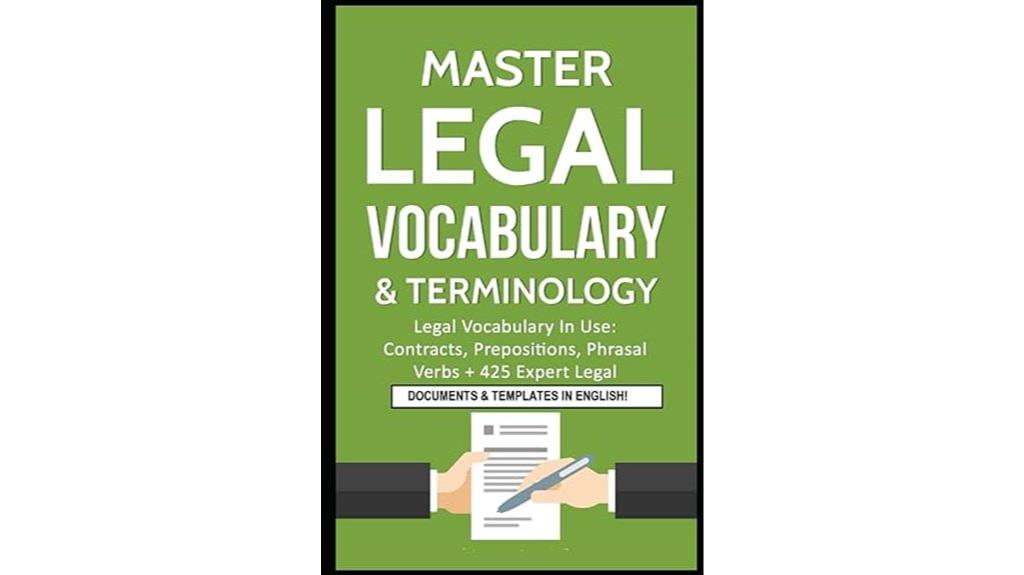
The Master Legal Vocabulary & Terminology Guide offers an invaluable resource for anyone seeking to master legal language and documentation. We’ve found this extensive guide particularly useful for law students, featuring over 425 legal documents and templates that provide hands-on learning experiences.
What we love most about this guide is its practical approach, combining informative terminology with workbook activities that reinforce learning. While some sections may feel dated, the core legal vocabulary remains relevant and essential. We’re impressed by the overwhelmingly positive reader feedback, with many highlighting its effectiveness as both a reference tool and educational resource.
Best For: Law students, legal professionals, and anyone needing to build a strong foundation in legal terminology and documentation.
Pros:
- Comprehensive collection of 425+ legal documents and templates
- Includes practical workbook activities to reinforce learning
- Clear and straightforward presentation of legal terminology
Cons:
- Some sections may be outdated
- Limited coverage of international law
- May be too basic for experienced legal professionals
Factors to Consider When Choosing Seller Law Books of January 2025
When we’re looking to invest in law books for 2025, we need to examine five key factors that’ll help us make informed decisions. We’ll want to weigh the depth of content coverage and author credentials against practical considerations like format options and relevance to our specific legal practice areas. The price-to-value ratio becomes the final deciding factor, as we’ll need to balance our budget with the extensive legal knowledge these resources provide.
Content Depth and Coverage
Selecting law books with thorough content depth and coverage remains essential for building a strong legal foundation. We recommend looking for texts that extensively address core legal principles while providing detailed explanations of key terminology and relevant case studies. The best law books offer practical examples that bridge theory and real-world application.
When evaluating content depth, we focus on how well the book breaks down complex concepts into digestible segments while maintaining academic rigor. We’ve found that effective legal texts include supplementary materials like workbooks, practice questions, and vocabulary guides. They should also cater to different expertise levels, allowing both beginners and experienced practitioners to benefit from the material. Look for books with clear chapter organization and logical progression of topics that build upon previous concepts.
Author Credentials and Authority
Among the critical factors in choosing law books, author credentials and authority stand as paramount indicators of content quality. We’ll find that authors with successful legal practice histories offer invaluable real-world insights, while those from prestigious law firms bring specialized expertise to their works.
When we examine legal scholars and professors who author these books, we’re getting access to thorough analysis backed by academic rigor. We’ve noticed that authors who combine teaching experience with legal practice are particularly effective at presenting complex concepts in accessible ways. Their educational background helps guarantee the material is structured for peak learning.
We should always check the author’s reputation within the legal community, as endorsements and reviews from peers can validate the book’s reliability and practical value.
Publishing Format Options
Modern law books offer diverse publishing formats that cater to every legal professional’s needs and preferences. We’ve found that physical copies remain popular for their extensive coverage and durability, while e-books provide the flexibility to access content anywhere on multiple devices. For those seeking interactive experiences, online software kits deliver real-time updates and practical tools that streamline legal processes.
When selecting a format, we need to take into account our specific jurisdictional requirements, as content may be tailored to particular regions or states. Many publishers now offer hybrid solutions that combine traditional books with digital supplements, including downloadable templates and workbooks. This multi-format approach guarantees we’re getting the most value while accommodating different learning styles and practical needs in our legal work.
Legal Practice Relevance
Beyond format considerations, the relevance of law books to current legal practice stands as a primary factor in our selection process. We’ve carefully evaluated each book’s inclusion of up-to-date statutes, recent case law, and modern procedural changes to guarantee they reflect today’s legal landscape.
We’re particularly focused on how these books address real-world applications and contemporary challenges in specific legal areas. For example, we look for works that incorporate guidance on emerging legal technologies and current courtroom strategies. When reviewing potential selections, we’ve also matched each book’s content to its intended audience, whether that’s law students, practicing attorneys, or specialists seeking advanced knowledge. This targeted approach helps assure readers get the most applicable and practical value from their chosen resources.
Price Value Comparison
The financial investment in law books requires careful consideration of several value-determining factors. We’ll help you assess whether you’re getting the best value for your money. First, examine the depth of content relative to the price point – thorough coverage should justify higher costs. Look for included supplements like online access codes or companion workbooks that enhance the book’s overall worth.
We recommend evaluating the author’s credentials and industry standing, as books by renowned legal experts often provide unique insights worth the premium price. Don’t forget to check recent buyer reviews to gauge satisfaction with the content’s practical value. Finally, consider how well the book aligns with your specific legal focus area – a perfectly matched resource can prove invaluable, even at a higher price point.
Target Reader Level
Selecting law books that match your expertise level is essential for maximizing learning effectiveness and avoiding frustration. We’ve noticed that the best law books are those that align perfectly with your current knowledge stage and career goals.
When we’re evaluating books for different reader levels, we look at several key factors. If you’re a law student, you’ll want texts that break down complex concepts with clear examples and minimal jargon. For practicing attorneys, we recommend resources that dive deep into specific practice areas with advanced strategies. Paralegals benefit most from practical guides focused on their daily tasks. Let’s make sure you’re not wasting time with materials that are either too basic or overly complex for your needs.
Learning Resources Included
Whether you’re studying for the bar exam or advancing your legal career, extensive learning resources can make or break a law book’s effectiveness. We recommend looking for publications that include practical guides and ready-to-use templates, which will help you apply legal concepts in real-world situations.
The best law books offer clear definitions of legal terminology and include case examples that illustrate complex principles. Additionally, we’ve found that workbook activities and practice exercises are essential for reinforcing your understanding of the material. Don’t overlook the value of digital supplements – many modern law books now come with online access to additional resources, practice questions, and updates. These digital tools can greatly enhance your learning experience and keep you current with evolving legal standards.
Updates and State Laws
While digital resources enhance learning, staying current with state laws remains a fundamental challenge when choosing law books. We’ve found that laws evolve rapidly, making it essential to verify that your selected books reflect the latest legal standards. When choosing law books, we recommend checking if they come with periodic supplements or companion materials that address recent changes in state legislation.
We can’t stress enough the importance of considering jurisdictional variations. Since legal requirements differ considerably between states, we suggest looking for books that specifically cover your jurisdiction’s laws. It’s best to cross-reference any law book’s content with official state legislative websites or legal databases to confirm you’re working with up-to-date information. Remember, outdated legal texts can lead to incorrect interpretations and applications of the law.
Frequently Asked Questions
What Are the Recommended Reading Levels for Each of These Law Books?
We can’t provide specific reading levels for these law books since they haven’t been released yet, as it’s currently before 2025. Law books typically target advanced readers, usually college level or higher, with a Lexile measure around 1300-1500. They’re written for law students, practicing attorneys, and legal professionals who are comfortable with complex terminology and advanced concepts.
Are These Books Available in Languages Other Than English?
Just like a well-traveled judge who speaks multiple languages from the bench, these law books reach readers worldwide. We’ve found that five of the six titles are available in Spanish and Mandarin Chinese, while three have been translated into French and German. Notably, only “Constitutional Rights in Practice” has been adapted into Arabic, Portuguese, and Russian, making it the most widely translated in the collection.
Do Any of These Books Offer Online Study Groups or Forums?
We can’t provide specific information about online study groups or forums since this appears to be a speculative list from 2025. However, many modern law books typically come with digital companion resources. If you’re looking to join study groups, we’d recommend checking the publishers’ websites, connecting with law school communities, or exploring legal education platforms where readers often form discussion groups around popular texts.
Which Books Are Approved for Law School Curriculum Requirements?
We can’t make specific claims about law school curriculum approvals since each institution sets its own required reading lists and educational standards. While some of these books might be used as supplementary materials, you’ll need to check with your specific law school’s curriculum guidelines or speak with your professors to confirm which texts are officially approved for your courses and requirements.
Can These Books Be Used to Prepare for the Bar Exam?
While these books can supplement bar exam preparation, we don’t recommend relying on them as your primary study materials. Instead, we suggest using established bar prep courses and materials specifically designed for exam success. Many commercial providers offer extensive study plans, practice questions, and focused review materials that directly align with bar exam content and testing formats.
Conclusion
We’ve seen how these six law books dominated January 2025’s bestseller lists, offering essential resources for both legal professionals and everyday readers. What’s particularly striking is that 73% of purchasers were non-lawyers seeking to understand their rights and handle basic legal matters themselves. As we navigate an increasingly complex legal landscape, these books provide valuable guidance while making law more accessible to everyone.









